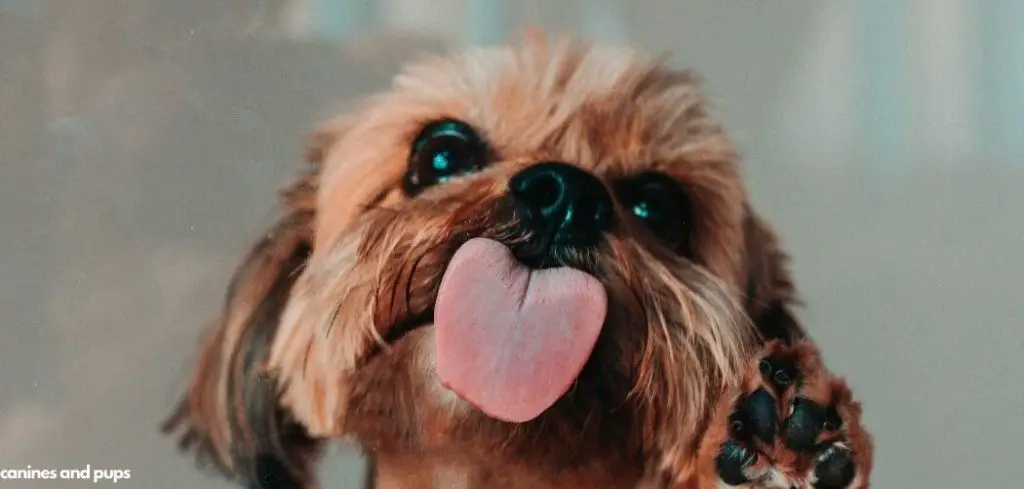It can be concerning to see a dog excessively licking its lips after eating, especially if it happens frequently.
While some lip licking can be normal, persistent or exaggerated licking may signal an underlying issue that needs attention.
We outline the common reasons why a dog may excessively lick their lips after eating, what you can do at home, and when to seek veterinary help.
Dog Excessively Licking Lips After Eating — Why It Happens
Dogs may lick their lips after eating for several reasons, ranging from normal behavior to medical issues. It could be due to leftover food particles, nausea, acid reflux, or dental pain. Sometimes it’s related to stress or anxiety triggered by mealtime.
In more serious cases, lip licking after eating can point to gastrointestinal disorders, oral disease, or even neurological problems.
Understanding the context and associated symptoms is key to determining whether it’s harmless or a sign of something more concerning.

Dog Excessively Licking Lips After Eating: Common Causes
Acid Reflux or Indigestion
Acid reflux, also known as gastroesophageal reflux, can cause irritation in a dog’s throat and esophagus after meals.
This discomfort often makes dogs lick their lips repeatedly as they try to soothe the sensation.
Dog parents may also notice swallowing, gulping, or signs of nausea. Left untreated, chronic reflux can cause pain, weight loss, and reduced appetite.
Read more: Dog Excessively Licking Lips and Drooling (What means)
Dental Disease
Dental problems like gum inflammation, tooth decay, or oral infections can make eating uncomfortable.
After meals, dogs may lick their lips excessively to cope with the lingering pain or irritation.
Bad breath, pawing at the mouth, or reluctance to chew hard food are often clues. Dental disease is progressive, so ignoring it can lead to serious infections and tooth loss.
Nausea or Upset Stomach
When dogs feel nauseous, lip licking is a common reflexive response. After eating, nausea may be triggered by spoiled food, sudden diet changes, or underlying health conditions like pancreatitis.
Vomiting, drooling, or restlessness often accompany nausea-related lip licking. Persistent nausea after meals should always be investigated by a veterinarian.
Food Allergies or Sensitivities
Some dogs develop allergies or intolerances to ingredients in their food, which can cause lip licking after eating.
The irritation may stem from itching around the mouth or mild digestive upset. Other signs of food allergies may include ear infections, itchy skin, or chronic gastrointestinal problems.
Identifying and eliminating the trigger food through a veterinary diet trial is the best approach.
Stress or Anxiety
For some dogs, mealtime can trigger anxiety, especially in multi-pet households or when there is competition for food.
Dogs may excessively lick their lips as a calming signal, trying to ease their stress.
Other signs may include pacing, whining, or refusing to eat unless in a quiet environment.
Stress-related licking should be addressed with environmental adjustments and positive reinforcement.
Neurological Disorders
In rare cases, neurological problems can cause abnormal repetitive behaviors like excessive lip licking after meals.
Seizure activity, compulsive disorders, or neurological damage may lead to this symptom.
Dog parents might notice other signs such as tremors, uncoordinated movements, or sudden behavioral changes. These cases require urgent veterinary evaluation.
Read more: Dog Excessively Licking Lips Suddenly (When to worry)
What to Do If Your Dog Is Excessively Licking Their Lips After Eating
If a dog is licking its lips after meals, start by observing when it happens and whether it’s accompanied by other symptoms.
Keep mealtimes calm and avoid feeding human foods that might upset the stomach. Offering smaller, more frequent meals can sometimes reduce reflux or indigestion.
Ensuring your dog has access to fresh water and is fed high-quality, balanced food may also help.
For dogs with suspected food sensitivities, working with a vet to try an elimination diet can identify problematic ingredients.
If anxiety seems to be the trigger, feeding in a quiet space away from other pets can make a difference.
Dental care, including regular brushing and professional cleanings, is vital for dogs showing signs of oral discomfort.
When to Call or Visit Your Vet
Not all cases of lip licking require emergency care, but persistent or worsening symptoms should not be ignored.
If your dog vomits, drools excessively, refuses to eat, or shows signs of pain, veterinary attention is needed.
Similarly, if the lip licking is paired with weight loss, lethargy, or changes in behavior, it could indicate a more serious issue.
Seek urgent veterinary care if your dog has sudden excessive lip licking along with tremors, collapse, or repeated vomiting.
These may signal conditions like poisoning, pancreatitis, or neurological disorders that need immediate treatment. Even if symptoms seem mild, consulting with a veterinarian helps rule out serious causes and gives peace of mind.
Read more: Dog licking lips excessively (Possible causes explained)
Key Takeaway
Excessive lip licking after eating in dogs can sometimes be normal, but frequent or intense episodes are often a sign of an underlying issue.
From acid reflux and dental problems to food sensitivities or anxiety, the causes can vary widely.
Dog owners should monitor their dog’s overall health, eating habits, and any additional symptoms. If the behavior persists or worsens, seeking veterinary advice ensures that the right cause is identified and treated effectively.
With attentive care, most dogs can return to comfortable and stress-free mealtimes.
